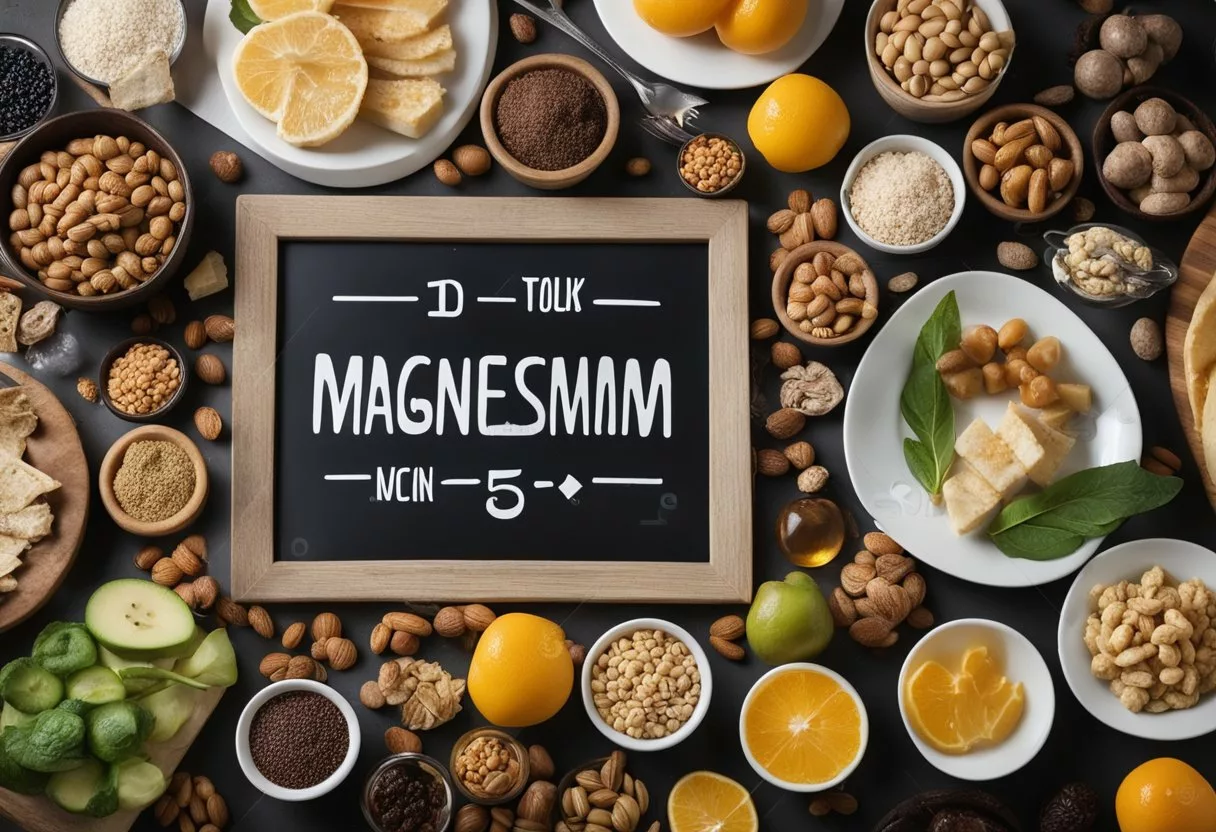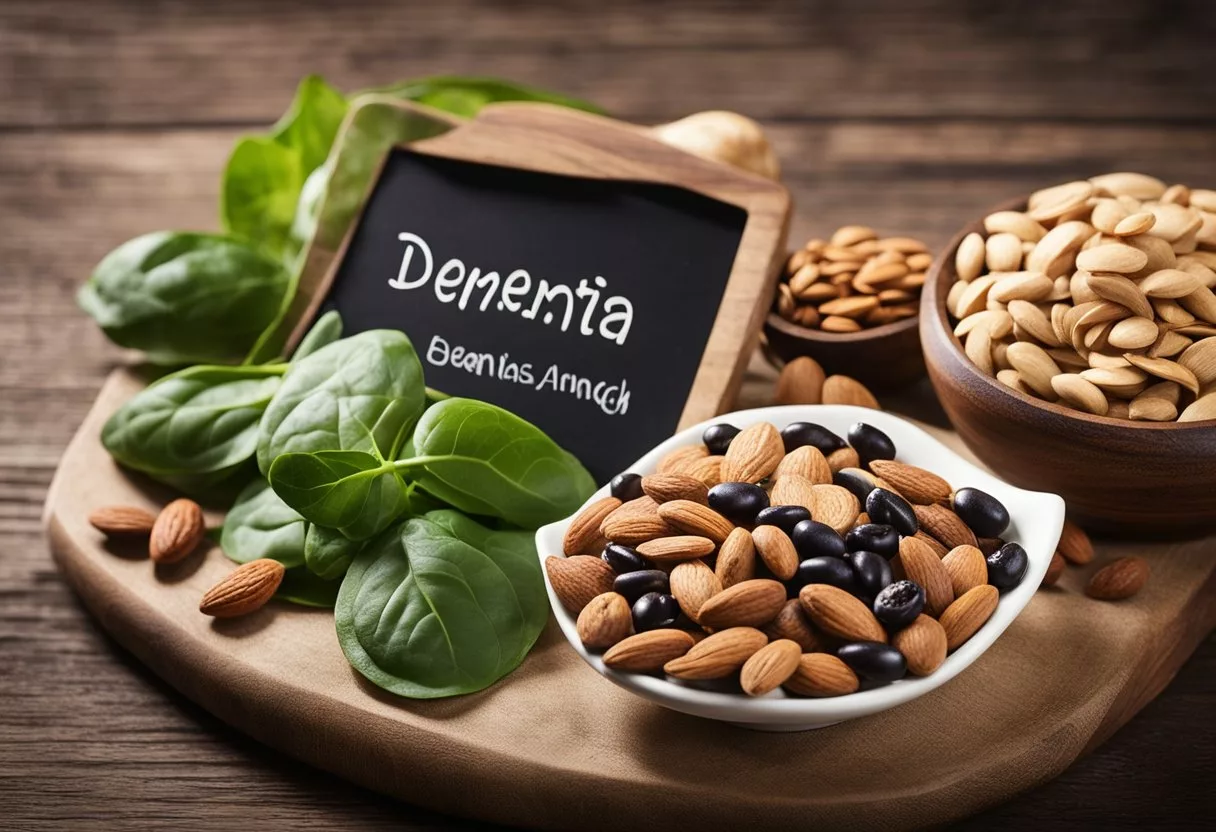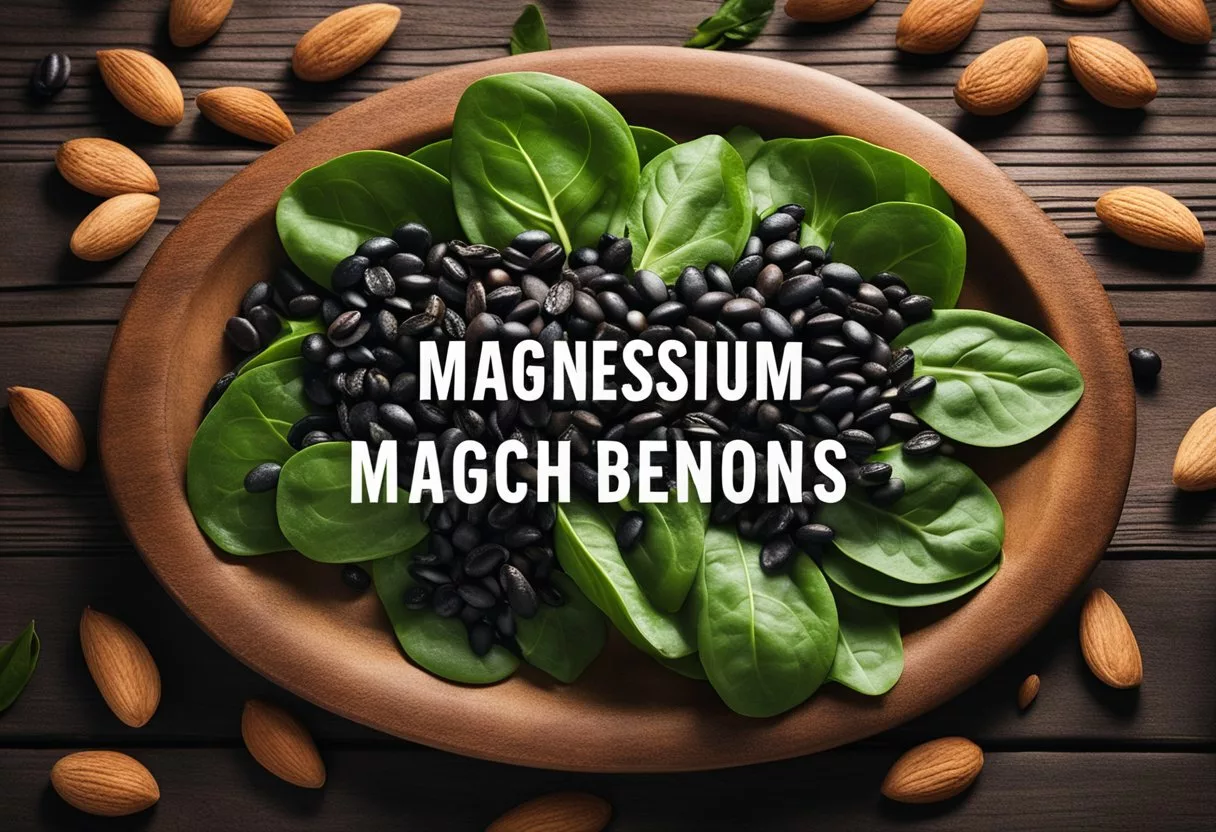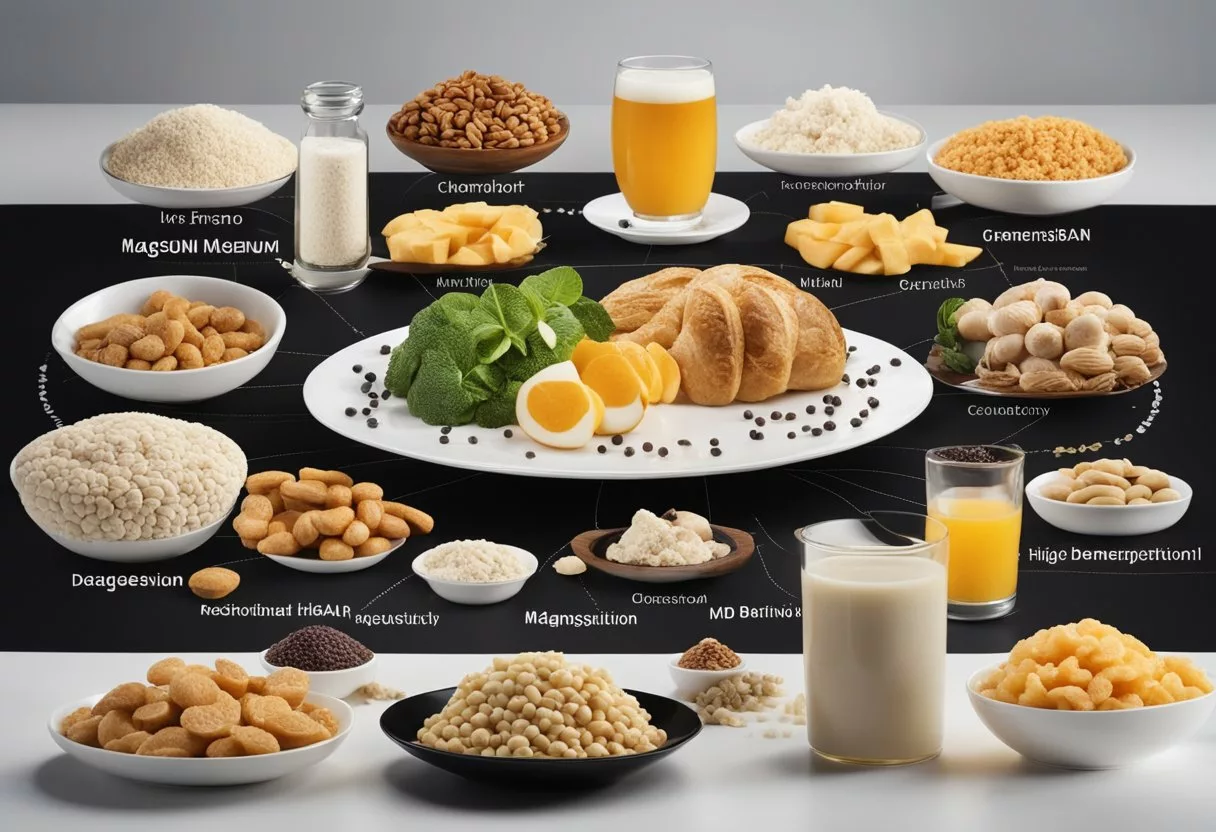I’ve observed a growing body of research that illustrates a distinct link between diet and cognitive health, particularly highlighting the role of magnesium-rich foods in potentially reducing the risk of dementia. Not only is magnesium a vital mineral for many bodily functions, but recent studies suggest its intake could influence the health of our brain. Foods such as dark chocolate, leafy greens, and nuts are not only nutritious but may also provide a protective effect against cognitive decline.
Understanding the importance of magnesium in the diet becomes more crucial as we explore its connection to brain health. With rising dementia cases globally, identifying dietary factors that could mitigate risk factors is of utmost priority for researchers and healthcare providers alike. The increased intake of magnesium has been associated with positive outcomes in brain health, leading to in-depth investigations into how this essential nutrient can support cognitive function as we age.
Key Takeaways
- Magnesium is integral for overall health and may be particularly beneficial for the brain.
- Regular consumption of magnesium-rich foods has a potential association with lower dementia risk.
- Incorporating a variety of magnesium-rich foods into one’s diet is a proactive step towards maintaining cognitive health.
Importance of Magnesium in the Diet

Magnesium is an essential nutrient that plays a pivotal role in my body’s function. Securing an adequate intake is critical for maintaining brain health and potentially reducing the risk of dementia.
Recommended Daily Magnesium Intake
Adults like me should aim to ingest a specific amount of magnesium daily. The National Institutes of Health recommends a daily magnesium intake ranging from 310 to 420 mg, varying by age and sex. Intake exceeding these amounts can lead to undesirable effects. However, recent findings suggest that higher magnesium intake, above 550 mg per day, has been linked with a younger brain age.
Sources of Dietary Magnesium
I ensure my diet includes several magnesium-rich foods to meet the recommended daily intake. For example, nuts and spinach are excellent sources of dietary magnesium. A well-planned diet encompassing various food groups allows for adequate magnesium levels. Here’s a brief list of magnesium-rich foods I include in my meals:
- Nuts and Seeds: Almonds, cashews, and pumpkin seeds
- Leafy Greens: Spinach, kale, and Swiss chard
- Legumes: Black beans, chickpeas, and lentils
- Whole Grains: Brown rice, quinoa, and whole wheat bread
The Connection Between Magnesium and Brain Health

In recent years, my research has highlighted magnesium as a key mineral for maintaining brain health. Especially pertinent are its neuroprotective effects, its role in cognitive function, and its potential to combat age-related brain shrinkage.
Neuroprotective Effects of Magnesium
Magnesium plays a pivotal role in protecting the brain. By regulating neurotransmitter activities, it helps maintain the brain’s structural integrity. Studies have indicated that higher magnesium levels can act as a defense against external brain injury and internal neural issues. Specifically, optimal magnesium levels have been linked to reduced inflammation and less oxidative stress within the brain.
Magnesium’s Role in Cognitive Function
My understanding of cognitive function also emphasizes the importance of magnesium. This mineral is crucial for learning and memory as it influences the synaptic plasticity of neurons—essentially, the brain’s ability to continue to learn and adapt. I’ve found that adequate magnesium ensures that the signaling necessary for cognitive processes is efficient, contributing to better learning, memory, and overall cognitive health.
Magnesium and Age-Related Brain Shrinkage
As we age, our brains naturally shrink, which can affect brain volume and functionality. Magnesium’s role in combating this process is noteworthy. Higher magnesium intake has been correlated with a significant decrease in the rate of brain aging by preserving brain volume. Moreover, diets rich in magnesium are thought to yield a brain that is younger by structural measures compared to those with lower magnesium intake.
Understanding Dementia and Cognitive Decline

Dementia is a collective term for progressive degenerative brain syndromes which affect memory, thinking, behavior, and emotion. The significance of this public health issue is underscored by its rising numbers; by 2050, cases of dementia are projected to reach 152.8 million globally. Nutrition plays a critical role in the management and potential prevention of cognitive decline.
Factors Contributing to Dementia
Epidemiology: The occurrence of different types of dementia varies worldwide, influenced by genetic, environmental, and lifestyle factors. Age is the strongest known risk factor, with prevalence rising significantly as populations live longer.
Cognitive Decline: Cognitive abilities naturally decrease with age, but for some, this decline significantly impairs daily living and leads to dementia. Identifying markers and early intervention strategies is key to slowing or averting progression.
Preventing Cognitive Decline with Nutrition
Nutrition: My diet significantly affects my brain health. For example, higher magnesium intake is linked to a lower risk of dementia. Foods rich in this mineral, like spinach and nuts, could be beneficial.
Public Health: As a cornerstone of public health strategy, promoting better nutrition offers a non-pharmacological approach to reduce the dementia burden. By focusing on dietary changes, we could mitigate the impact of cognitive decline on communities.
Magnesium’s Impact on Aging and the Brain

Magnesium plays a crucial role in brain health, influencing the aging process and potentially altering brain age.
Magnesium Levels and Brain Age
Research indicates that higher magnesium intake is closely related to maintaining a younger brain age. One study suggests that consuming over 550 mg of magnesium daily could be associated with having a brain that is approximately one year younger by the time an individual reaches 55, compared to those with lower magnesium intake.
This fortifies my understanding that essential minerals like magnesium are beneficial in slowing down the cognitive decline often associated with aging.
Magnesium Intake Through Life Stages
As I age, my magnesium needs fluctuate. During adulthood, maintaining stable magnesium levels is essential, as evidenced by the fact that adults should consume around 5-7 mg/kg/day to maintain a healthy balance. Moving into older age, especially for women, menopause can signify a time of significant change in magnesium requirements. Adequate magnesium intake becomes even more important as it may influence cognitive health and longevity.
Role of Magnesium-Rich Foods in Dementia Risk Reduction

Recent studies have established a notable link between dietary magnesium intake and reduced risk of developing dementia. I’ll be exploring the epidemiological evidence supporting magnesium’s benefits and the potential ways to integrate this knowledge into dietary strategies and public health interventions for better brain health.
Epidemiological Evidence of Magnesium’s Benefits
Epidemiological studies have shed light on the potential protective role of magnesium against cognitive decline. Research highlighted by Medical News Today suggests that higher magnesium intake may be associated with a lower risk of dementia. Moreover, an investigation into daily magnesium consumption found that an intake above 550 mg is correlated with younger brain age compared to a lower daily intake. These findings point to magnesium’s potential role in maintaining cognitive health and deterring the onset of dementia-related symptoms.
Dietary Strategies and Public Health Interventions
When considering the application of these findings, I focus on dietary strategies promoting the consumption of magnesium-rich foods, such as spinach, nuts, and whole grains. A study mentioned by Science Daily emphasizes increased intake of these foods to help reduce dementia risk. It states that such dietary adjustments are crucial for public health interventions.
Public health officials could use these insights to formulate guidelines that encourage the inclusion of magnesium-rich foods in daily diets. This preventative approach may offer a cost-effective means to decrease the incidence of dementia within the population over time.
Specific Magnesium-Rich Foods and Their Benefits

Magnesium is essential for brain health, and I’m finding that several foods are notably rich in this important nutrient. Let’s explore some specific foods that contain high levels of magnesium and discuss how they contribute to cognitive health.
Nuts and Brain Health
Nuts are a powerhouse of nutrients, including magnesium. Almonds, cashews, and Brazil nuts are among the top contenders. A study suggests that higher magnesium intake is linked to a lower risk of dementia, and regular consumption of magnesium-rich nuts supports this association.
Seeds and Their Impact on Cognition
Like nuts, seeds such as flaxseeds, pumpkin seeds, and chia seeds are excellent sources of magnesium. Inclusion of these seeds in one’s diet can be a natural strategy for maintaining brain health. Seeds not only contribute to one’s overall nutrient intake but also provide magnesium that is critical for cognitive functions.
Magnesium in Leafy Green Vegetables
Leafy green vegetables, especially spinach, are loaded with magnesium. Spinach provides approximately 78 mg of magnesium per half cup when cooked, making it an easy addition to any meal for a brain-healthy boost. The connection between magnesium intake from leafy greens and cognitive health is strong, with indications that it could play a role in reducing the risk of cognitive decline.
Legumes as a Source of Magnesium
Legumes such as lentils, chickpeas, and black beans are not only high in fiber and protein but also an excellent source of magnesium. Integrating legumes into my diet ensures a steady supply of this nutrient, which may help protect the brain from the effects of aging and neurological diseases.
Whole Grains and Cognitive Health
Finally, whole grains such as brown rice, quinoa, and whole wheat provide essential nutrients, including magnesium. A diet that includes whole grains can contribute to a lower risk of developing cognitive health issues. Whole grains offer a dual benefit: necessary fiber for digestion and magnesium for brain health.
By incorporating these magnesium-rich foods into my daily routine, I’m confident that I’m supporting my brain health as well as overall well-being.
Magnesium Supplementation and Brain Health

A growing body of research highlights the positive impact of magnesium on brain health. With my focus here, I aim to guide you through when magnesium supplements might be necessary and the comparison between these supplements and natural food sources of the mineral.
When to Consider Magnesium Supplements
It’s important to recognize that while a magnesium-rich diet is ideal, there are scenarios where my dietary intake may not be sufficient. For individuals who have difficulty absorbing nutrients or for those with increased magnesium needs due to medical conditions or medications, supplements can be beneficial. Moreover, recent studies point to the potential of magnesium intake above 550 mg daily in promoting better brain health and reducing the risk of dementia.
Supplements vs. Natural Food Sources
Supplement Advantages:
- Targeted Dosage: Supplements contain a specific amount of magnesium, making it easier to monitor intake.
- Beneficial for Deficiencies: They are a quick method to address deficiencies and can be tailored to individual needs.
However, I always consider the merits of natural sources:
- Nutrient Complexity: Foods offer a complex nutrient profile that supplements can’t match. For example, magnesium-rich foods like leafy greens also provide fiber and other vitamins and minerals.
- Enhanced Absorption: Nutrients from food sources are generally more easily absorbed and utilized by my body.
Ultimately, while supplements serve a purpose in certain cases, aiming for a magnesium-rich diet with foods like dark leafy greens, nuts, seeds, and whole grains is the foundation for brain health. The synergy of a well-rounded diet inherently supports cognitive function beyond just the benefits of magnesium.
Research and Studies on Magnesium and Dementia

Recent studies have provided valuable insights into the role of magnesium in preventing or managing dementia. I’ll discuss three important contributions from distinguished sources.
Key Findings from the European Journal of Nutrition
The European Journal of Nutrition has published findings suggesting a complex relationship between serum magnesium levels and dementia risks. Specifically, high magnesium intake is linked with a decreased risk of dementia. However, there are indications that both low and high serum magnesium levels can be associated with an increased risk of Alzheimer’s disease and mixed dementia. This implies the need for maintaining a balanced level of magnesium.
Insights from the Australian National University
Research from the Australian National University strengthens the argument for magnesium-rich diets in dementia prevention. They recommend increased consumption of foods like spinach and nuts to potentially reduce the risk of developing dementia. Their observations suggest that dietary adjustments to increase magnesium intake may be a practical approach to combat this pervasive condition.
Data Analysis from the UK Biobank
In terms of large-scale population studies, the UK Biobank has provided valuable data analyses. This extensive resource links higher magnesium intake to a lower dementia risk. By examining thousands of middle-aged adults over an extended period, their study found that those with the highest magnesium levels had a considerably lower chance of developing dementia compared to those with lower levels. This underscores the potential of magnesium as a part of dietary strategies for dementia risk reduction.
Practical Advice for Magnesium Intake

In managing and potentially reducing the risk of dementia, I focus on optimizing magnesium intake through dietary choices. Here’s how adults can effectively include magnesium-rich foods in their diets.
How to Incorporate Magnesium-Rich Foods into Your Diet
To incorporate a magnesium-rich diet, I recommend a balanced approach with diverse food choices. The Mediterranean diet, naturally abundant in magnesium, emphasizes the consumption of whole grains, leafy greens, nuts, and seeds—all excellent sources of magnesium. A daily plan might include spinach in a breakfast omelet, almonds as a snack, and quinoa with dinner. It’s important to aim for steady, daily consumption instead of sporadic high doses.
Here is a simple daily menu example to ensure adequate magnesium intake:
- Breakfast: Spinach and feta omelet with whole-grain toast.
- Snack: A handful of almonds and yogurt.
- Lunch: Quinoa salad with cherry tomatoes, cucumbers, and chickpeas.
- Dinner: Grilled salmon with a side of steamed broccoli and brown rice.
Incorporating these foods into meals is both practical and beneficial for maintaining cognitive health.
Magnesium Intake Questionnaire and Assessment
I utilize a magnesium intake questionnaire to help adults assess their dietary habits. This questionnaire examines current consumption levels of magnesium-rich foods and identifies areas for improvement. Based on the responses, I can determine if their diet aligns with the recommended dietary allowance (RDA), which for adult women is typically between 310 to 320 milligrams per day, and 400 to 420 milligrams per day for men.
Sample Questions:
- How many servings of leafy greens do you consume per week?
- Do you regularly eat magnesium-rich foods like avocados, nuts, and whole grains?
- Can you estimate the amount of magnesium you consume daily?
By assessing your diet with these questions, you can get a clearer picture of your magnesium intake. However, for personalized medical advice, consulting with a healthcare professional is essential. They can provide tailored recommendations based on specific health needs.
In summary, regularly including magnesium-rich foods in your diet can be a key factor in maintaining brain health, especially as you age. Regular assessment of your magnesium intake with a detailed questionnaire can help ensure you’re getting the beneficial levels of this important mineral.
Frequently Asked Questions
In this section, I’ll answer common questions about magnesium’s role in brain health, specifically relating to cognitive decline and dementia.
What dietary sources provide high levels of magnesium beneficial for brain health?
I understand that nuts, spinach, and whole grains are excellent sources of magnesium, which is known to be crucial for brain function. Regular inclusion of these foods in a diet can help maintain good brain health.
How can magnesium intake influence cognitive decline or dementia?
Studies have shown that higher magnesium intake may be linked to a lower risk of dementia. Adequate levels of magnesium are thought to support cognitive health.
What are the recommended daily amounts of magnesium for cognitive support?
The Recommended Dietary Allowance (RDA) for magnesium suggests adult women need 310 to 320 milligrams per day, and adult men require 400 to 420 milligrams per day for general health, which includes cognitive support. Monitoring these levels is important for overall brain health.
Can consuming magnesium-rich foods improve symptoms of brain fog?
Magnesium plays a role in various bodily functions that can affect brain fog. Increasing intake of magnesium-rich foods might help improve cognitive clarity, but individual responses can vary.
In what way does magnesium contribute to brain repair and neuroprotection?
Magnesium is essential for nerve function and has been found to be involved in neuroprotection. Adequate magnesium levels can support the brain’s repair mechanisms and contribute to reducing damage from oxidative stress.
What are the potential benefits of magnesium supplements in dementia prevention?
While whole foods are the best source of magnesium, supplements may be beneficial in reaching adequate intake levels. Consistent and adequate magnesium consumption, either through diet or supplements, can be part of a strategy for dementia prevention, though they should be taken with professional guidance.